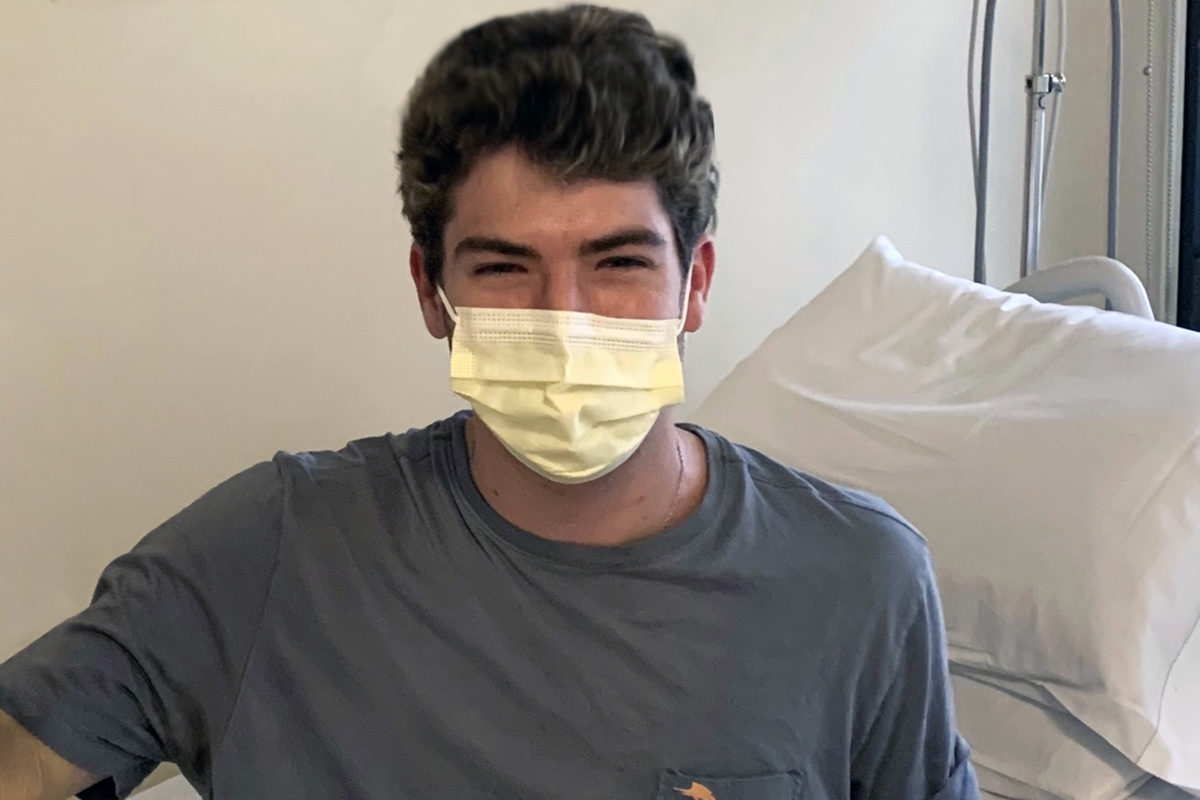
When Alec Fisher signed up as a potential bone marrow donor two years ago, he didn’t expect to hear back for a while, if at all — and certainly not in the middle of a pandemic.
As someone who has had personal experiences with serious health issues, Fisher felt a calling to donate. When he matched, the 20-year-old upcoming senior drove to Scripps Green Hospital San Diego to donate stem cells for a person battling leukemia.
“You can’t let fear push you away from things,” Fisher said. “The fact is I can provide something for this person that could save their life, and I didn’t want to let fear take that away.”
This journey technically started in 2018, when Fisher was a freshman. The Ventura native signed up to donate bone marrow with a program called DKMS, an international nonprofit organization dedicated to the fight against blood cancer and blood disorders. At the time, he was debating on whether or not he really wanted to sign up, as he figured the odds of actually being asked to donate were so small.
The real deciding factor was his own family’s experience with medical issues. His father had cancer, his mother has a degenerative spine disease and his older brother has cystic fibrosis.
“Seeing it from that other perspective, if I can provide something for someone who genuinely needs it, I don’t see any harm in registering,” Fisher said. “If I can help, I don’t see why I shouldn’t.”
USC student undergoes 4-hour stem cell donation procedure
According to DKMS, those who register can potentially donate either bone marrow or blood stem cells, depending on the needs of the patient. In Fisher’s case, he was asked to donate blood stem cells as part of a clinical trial. For his procedure — known as a peripheral blood stem cell donation — blood is drawn through one arm and passed through a machine that filters out the blood stem cells, then the remaining blood is returned through his other arm. The bone marrow procedure requires the patient to be put under while a needle extracts the marrow from the thigh bone.
Fisher couldn’t divulge extensive information about the recipient, but he did say that the patient is undergoing chemotherapy and radiation to destroy unhealthy stem cells and his cells will serve as replacements. Also, due to the COVID-19 situation, his donated cells are being frozen until the patient is safely able to receive the transplant.
Despite it being the “less painful” route than having a needle injected into his thigh, Fisher admits that he was a little nervous. After all, while the majority of his friends were taking the time off to decompress from finals and self-quarantine because of COVID-19, Fisher was about to spend four hours having his blood drawn, filtered and returned to his body.
“I don’t mind getting blood drawn, but the idea of getting it drawn for a very prolonged period of time kind of scared me,” he said. “After about hour two, I was like, ‘Just finish.’”
The complications of isolating from family during a pandemic
Though he described the procedure itself as uncomfortable, he said one of the most difficult elements was isolation from his family. As a pandemic-era precaution, Fisher’s mother Jill was not allowed past the hospital doors.
“I couldn’t even go in with him, which made me sad, but he was a trooper,” she said.
Like any mother whose son is about to undergo a medical procedure, Jill said she was worried about the toll it would take on Alec’s body — and the fact that he was part of a clinical trial.
“I think a lot of being anxious comes from the unknown,” she said. “We tried to be sure that we found out every detail about how the procedure was going to go.”
Ultimately, she trusted the hospital staff and was just happy her son was able to help out, especially during such a chaotic time.
“I think having an opportunity to do something good during this terrible time brought some purpose back to his life,” she said.
USC Spirit Leader believes in positivity, caring for others
Getting contacted to donate may have been quite the surprise, but given his path so far at USC, it seems almost fitting. This wasn’t the first time Fisher has had to take the unexpected with stride. From changing his major from engineering to Media Arts + Practice in the USC School of Cinematic Arts to taking classes solely online, Fisher has had to make some adjustments since arriving on campus.
“My philosophy has just always been to try to stay as positive as possible,” he said.
His positivity and selfless attitude are what led him to join both Trojan Knights and Troy Camp, one of USC’s oldest and largest student-run philanthropies. This year was also his second on USC Spirit Leaders, although basketball season was cut short and Fisher said he’s worried about football season as well.
“I’m a little sad about that, just because our team has grown so much and it’s been one of my favorite experiences at USC,” Fisher said. “We just have to take it day by day and wait until stuff gets better.”
Fisher admits that this has not been the easiest few months to remain positive, but that’s what made his donation so important. There were numerous barriers that could’ve prevented him from deciding to give, but he managed to look beyond all of that.
“The stress would get to me and I would just not want to do it at all, but I didn’t want those things to take away the fact that I could save a life,” he said. “Even in a global pandemic, you can do good in the world.”
